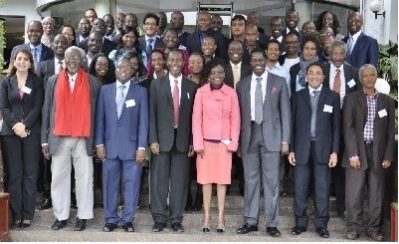
Policy research can directly support regional integration by addressing practical challenges through collaboration between the Government, private sector and academia in implementing the research programs. This was agreed at the 2nd Annual Research Forum taking place at the Nairobi Safari Club Hotel in Kenya from 27 June- 1 July. The forum, organized by the Common Market for Eastern and Southern Africa (COMESA) and the African Capacity Building Foundation (ACBF) focuses on ‘Trade in Services and Trade Facilitation for inclusive and sustainable industrialization in the COMESA Region’.
The COMESA-ACBF capacity building program in Economic and Trade Policy Research and Analysis was initiated to enhance the capacity of COMESA member states and its secretariat to undertake policy oriented research to foster evidence based policy decision-making.
“The purpose of the research forum was to share knowledge and deliberate on empirical issues of trade and related matters within the context of regional integration as well as providing an opportunity to inform policy development,” said Dr. Folasade Ayonrinde, Senior Program Officer, East and Southern Africa Operations at ACBF n her speech read on behalf of the ACBF Executive Secretary, Prof. Emmanuel Nnadozie.
She added that the forum was vitally important in a time of global economic uncertainty, following Britain’s decision to exit the European Union, and the importance of Regional Economic Communities (RECs), particularly as it relates to the political and economic benefits of being in a REC.
Dr. Ayonrinde emphasized that the outcomes of the research forum should contribute to strengthening the participation of governments, policy research think tanks, academia and the private sector in addressing challenges to the implementation of regional integration agenda and providing evidenced-based policy redirection. Particularly as it relates to negotiation capacities as well as implementation of trade obligations.
She concluded by urging experts to focus their discussions on evidenced-based issues that will champion deeper regional integration and attain economic growth.
According to Mr Jared Nyaundi, representing the Principal Secretary, State Department, Kenya Ministry of Industrialization, Trade and Cooperative, the forum was a platform to address challenges and come up with practical solutions to the region. He was optimistic that any emerging issues raised by the various authors in their papers would contribute to this course.
Mr Nyaundi started by saying that the COMESA Secretariat had been directed at the 34th Meeting of the Council held in Addis Ababa, Ethiopia in March 2015, to convene a meeting of policy think tanks and the private sector in the region to brief them on the frontier issues for research necessary to support regional integration.
The Principal Secretary, from the speech read on his behalf by Mr Nyaundi, expressed his sincere gratitude to the ACBF for its continued role in enhancing the African economic and trade policy capacity. He attributed the impact of the COMESA II project on enhancing COMESA’s member states’ capacity in economic and trade policy analysis and research, under whose auspices the 2nd annual research forum was held as a testimony of the Foundation’s excellent work.
He appealed to the COMESA Member States to consider making the program part of the COMESA regular programs and have a regular budget line other than fully relying on donors. He concluded by urging the participants to carefully consider each and every aspect of the empirical findings and emerging issues that could enhance policy decision within the framework of regional commitment to draw a way forward.
The Forum brought together stakeholders from the private sector (Microsoft Africa), academia, policy thinks, and government officials from COMESA member states and AfDB. The forum was attended by delegates from COMESA Member states from Burundi, Comoros, Djibouti, DR Congo, Egypt, Eritrea, Ethiopia, Kenya, Madagascar, Malawi, Mauritius, Seychelles, Swaziland, Rwanda, Sudan, Uganda, Zambia, and Zimbabwe.





